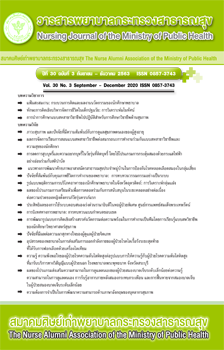Effectiveness of Inter-Professional Education to Collaborative Competency of Inter-Professional Practice and Happiness of Undergraduate Students
Main Article Content
Abstract
Inter-Professional Education (IPE) is considered to be essential to prepare students to readily work as a part of an interdisciplinary team. A quasi experimental research with one group posttest-design was conducted to examine the effectiveness of IPE on collaborative competency of Inter-professional practice and happiness of undergraduate students. The sample consisted of 26 undergraduate students selected by volunteer sampling, including fourth year nursing students from Borommarajonani College of Nursing Changwat Nonthaburi, medical students from Pranangklao Hospital, teaching profession students from Kasetsart University, and IT engineering students. The Interprofessional Collaborative Competencies Attainment Survey: ICCAS and Oxford Happiness Questionnaire: OHQ were used. Data were analyzed using percentage, mean, and standard deviation.
The results showed that overall competency level was high (mean 4.13, SD=.16). Analysis of each domain found that the communication competency was at a high level (mean 4.29, SD=.18), followed by conflict management/resolution and team functioning (mean 4.15, SD=.16), roles and responsibilities (mean 4.13, SD=.16), collaboration (4.08, SD=.15), and patient/family-centered approach (mean 3.96, SD=.15). Happiness of undergraduate students was high (mean 5.22, SD=.44). The educational institutes should continuously apply inter-professional education for their students every year.
Article Details
บทความและรายงานวิจัยในวารสารพยาบาลกระทรวงสาธารณสุข เป็นความคิดเห็นของ ผู้เขียน มิใช่ของคณะผู้จัดทำ และมิใช่ความรับผิดชอบของสมาคมศิษย์เก่าพยาบาลกระทรวงสาธารณสุข ซึ่งสามารถนำไปอ้างอิงได้
References
2. Ministry of Public Health. Office of Policy and Strategy. 20 Year National Strategic Plan (Public Health). Bangkok: the ministry;2016. (in Thai)
3. Ministry of Public Health. National Health Commission Office (NHCO). National 10-years manpower development plan (2018-2027). Bangkok: the ministry;2018. (in Thai)
4. The Health Professions Network Nursing and Midwifery office Framework for action on interprofessional education and collaborative practice. Geneva: WHO;2010.
5. National Statistical Office of Thailand. Thai People Statistic. Bangkok: the institute;2017. (in Thai)
6. Ministry of Public Health. Committee for Making Plans. The 12th National Health Development Plan (B.E. 2017-2021). Bangkok: the ministry;2018. (in Thai)
7. Turner K, Leungratanamart L, Reunreang T, Rakkwamsuk S. Development of a pedagogical model to promote 21st century skills of nursing students. Nursing Journal of the Ministry of Public Health 2018;28:127-38. (in Thai)
8. Schmitz CC, Radosevich DM, Jardine P, MacDonald CJ, Trumpower D, Archibald D. The Inter-professional Collaborative Competency Attainment Survey (ICCAS): a replication validation study. J Res Interprof Pract Educ 2016;31:28–34.
9. Rakrung K, Tanjan K, Kedsakool K, Natewong K, Phokpipat K, et al. Readiness in multidisciplinary teaching and learning of second and third year nursing students at Borommarajonani College of Nursing, Surat Thani, Nakhon Si Thammarat, Walailak College. J Public Health Nursing 2018;31:1-3. (in Thai)
10. Lawansiri V, Wattanakul A. Working happiness and competency of personnel at the National Health Securit Office (NHSO) headquarter [Thesis]. Bangkok: Kasetsart University;2012. (in Thai)
11. Argyle M. The psychology of happiness. 2nd ed. New York: Routledge Published;2001.
12. Worasuk N, Photisuvan C, Saisophon P. Happiness enhancement activity for nursing students in Boromarajonani College of Nursing, Changwat Nonthaburi. J Health Science Research 2017;11:80-89. (in Thai)
13. Hills P, Argyle M. The Oxford Happiness Questionnaire: a compact scale for the measurement of psychological well-being. The Oxford Happiness Project. Oxford: Oxford Brookes University;2001.

